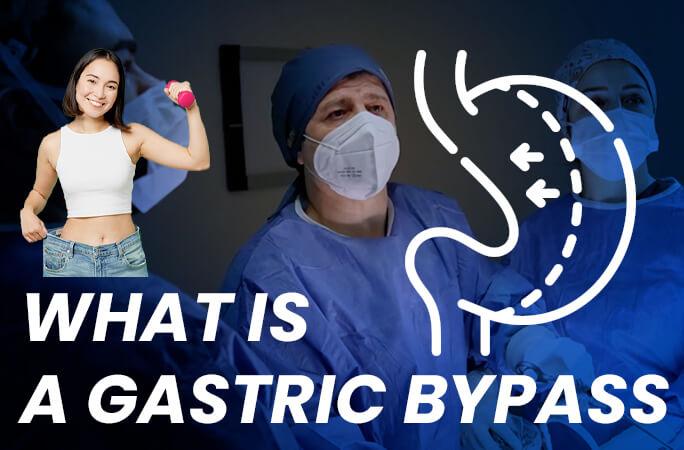
Gastric bypass surgery is a weight loss procedure that involves making changes to the digestive system. It is often used as a last resort for individuals who have not been successful in losing weight through other methods such as diet and exercise. Gastric bypass is a type of bariatric surgery that helps individuals achieve significant weight loss by reducing the size of their stomach and rerouting the small intestine.
Understanding Gastric Bypass Surgery
Gastric bypass surgery is a complex procedure that requires careful consideration and preparation. Before undergoing the surgery, it is important to have a clear understanding of the basics of gastric bypass and the medical purpose it serves.
The Basics of Gastric Bypass
Gastric bypass involves creating a smaller stomach pouch and rerouting the small intestine. This is achieved by dividing the stomach into two sections, a smaller upper pouch and a larger lower pouch. The smaller upper pouch is then connected directly to the small intestine, bypassing the larger lower pouch. The reduced size of the stomach restricts the amount of food that can be consumed, leading to weight loss.
But what happens to the larger lower pouch? Well, it doesn’t go to waste! In fact, it continues to produce digestive juices that aid in the digestion of food. These digestive juices flow into the small intestine, where they mix with the food coming from the smaller upper pouch. This ensures that the body can still absorb the necessary nutrients from the food, despite the reduced amount consumed.
One of the most common types of gastric bypass surgery is called Roux-en-Y gastric bypass. In this procedure, the surgeon staples the upper portion of the stomach to create a smaller pouch and then connects it directly to the small intestine. This bypasses a portion of the stomach and the first part of the small intestine, resulting in both restriction and malabsorption of food.
The Medical Purpose of Gastric Bypass
Gastric bypass surgery is primarily performed to treat obesity and its associated health conditions. Obesity is a chronic condition that can lead to various health problems such as type 2 diabetes, heart disease, high blood pressure, and sleep apnea. It can also have a significant impact on a person’s quality of life and psychological well-being.
But what exactly does gastric bypass surgery do to address these health conditions? Well, the significant weight loss achieved through gastric bypass surgery can have a profound impact on a person’s overall health. For example, losing excess weight can improve insulin sensitivity and blood sugar control, leading to better management of type 2 diabetes. It can also reduce the strain on the heart and lower blood pressure, decreasing the risk of heart disease. Additionally, weight loss can alleviate the symptoms of sleep apnea by reducing the amount of excess tissue in the throat that can block the airway during sleep.
Furthermore, gastric bypass surgery is not just about physical health. It can also have a positive impact on a person’s mental and emotional well-being. Losing a significant amount of weight can boost self-confidence and improve body image, leading to a better quality of life and improved psychological well-being.
In conclusion, gastric bypass surgery is a transformative procedure that can help individuals achieve significant weight loss and improve or resolve obesity-related health conditions. It is important to have a thorough understanding of the procedure and its medical purpose before making the decision to undergo surgery.
The Procedure of Gastric Bypass Surgery
Pre-Surgery Preparations
Before undergoing gastric bypass surgery, thorough preparation is essential. This may involve consultations with a healthcare team, including a surgeon, dietitian, and psychologist. The purpose of these consultations is to assess the individual’s suitability for the surgery, provide education about the procedure, and address any concerns or questions the patient may have. The healthcare team will take into account the patient’s medical history, current health status, and weight loss goals to determine if gastric bypass surgery is the right option.
During these consultations, the surgeon will explain the potential risks and benefits of the procedure, as well as the expected outcomes. The dietitian will provide guidance on the pre-surgery diet, which may involve reducing calorie intake and increasing physical activity to help the patient lose weight and prepare their body for the surgery. The psychologist will evaluate the patient’s psychological readiness for the surgery, as it is important for individuals to have realistic expectations and a strong support system in place.
The Surgical Process
The actual gastric bypass surgery typically takes several hours to complete and is performed under general anesthesia. The surgeon will make small incisions in the abdomen and insert special instruments, including a laparoscope, to guide the procedure. This minimally invasive approach allows for a faster recovery and reduced scarring compared to traditional open surgery.
Once the surgeon gains access to the stomach, they will carefully staple the upper portion of the stomach, creating a smaller pouch. This pouch will serve as the new stomach, limiting the amount of food that can be consumed at one time. The small intestine is then rerouted to connect directly to the stomach pouch, bypassing a portion of the stomach and the upper part of the small intestine. This rerouting of the digestive system helps to reduce the absorption of calories and nutrients, leading to weight loss.
Post-Surgery Care and Recovery
After the surgery, the patient will be closely monitored in the hospital for a few days. Pain medication, antibiotics, and other medications may be prescribed to help manage pain and prevent infection. The healthcare team will closely monitor the patient’s vital signs, incision sites, and overall recovery progress.
During the initial recovery period, the patient will be on a liquid diet to allow the stomach to heal. Gradually, they will progress to a soft diet and then solid foods, under the guidance of the dietitian. The healthcare team will provide ongoing support and education on proper nutrition, portion control, and lifestyle changes to ensure long-term success.
Regular follow-up appointments with the healthcare team will be scheduled to monitor progress, provide guidance on diet and exercise, and address any concerns or complications that may arise. These appointments are crucial for the patient’s continued success and to ensure that they are adapting well to their new lifestyle.
Benefits of Gastric Bypass Surgery
Weight Loss and Gastric Bypass
The primary benefit of gastric bypass surgery is significant and sustained weight loss. By reducing the size of the stomach and bypassing a portion of the small intestine, gastric bypass restricts the amount of food that can be consumed and absorbed by the body. This leads to a reduced calorie intake, resulting in weight loss. Studies have shown that individuals who undergo gastric bypass surgery can expect to lose a significant amount of excess weight within the first year after surgery.
Other Health Benefits
In addition to weight loss, gastric bypass surgery can improve or resolve obesity-related health conditions. Type 2 diabetes, for example, has been shown to improve or go into remission in many individuals following gastric bypass surgery. Other health benefits include improved cardiovascular health, reduced risk of certain types of cancer, and improvement in sleep apnea symptoms. Furthermore, weight loss can have a positive impact on psychological well-being and overall quality of life.
Risks and Complications of Gastric Bypass
Short-Term Risks
Like any surgical procedure, gastric bypass surgery carries certain risks and potential complications. In the short term, these may include infection, bleeding, blood clots, anesthesia-related risks, and adverse reactions to medications. These risks are typically rare but can be serious. It is important to discuss and understand these potential risks with the healthcare team before deciding to undergo surgery.
Long-Term Complications
Long-term complications of gastric bypass surgery may include nutritional deficiencies, digestive problems, dumping syndrome, gallstones, hernias, and ulcers. Nutritional deficiencies can occur due to reduced food intake and changes in the absorption of nutrients. Regular vitamin and mineral supplementation and close monitoring of nutrient levels are essential to prevent deficiencies. Digestive problems such as diarrhea, constipation, and bloating may also occur. Adherence to dietary recommendations and follow-up care can help manage and minimize these complications.
Life After Gastric Bypass Surgery
Dietary Changes and Restrictions
Following gastric bypass surgery, dietary changes are necessary to ensure long-term success and minimize the risk of complications. Initially, a liquid diet is introduced, followed by a gradual progression to soft and then solid foods. The intake of high-calorie, high-sugar, and high-fat foods should be limited, and portion sizes should be carefully controlled. Protein-rich foods, fruits, vegetables, and whole grains should form the basis of the post-surgery diet. Regular monitoring of nutrient levels and ongoing support from a dietitian are crucial to maintaining a healthy and balanced diet.
Lifestyle Adjustments and Exercise
Adopting a healthy lifestyle is an integral part of life after gastric bypass surgery. Regular physical activity is important for maintaining weight loss and improving overall health. Engaging in moderate-intensity exercise, such as walking, swimming, or cycling, for at least 150 minutes per week is recommended. Exercise should be done under the guidance of a healthcare professional and tailored to the individual’s abilities and preferences.
Psychological Impact and Support
Gastric bypass surgery can have a significant impact on a person’s psychological well-being. Adjusting to the physical changes and coping with the emotions and challenges associated with weight loss and body image can be challenging. It is essential to have a support system in place, which may include family, friends, and healthcare professionals. Seeking counseling or joining support groups can also provide valuable emotional support during the post-surgery period.
Gastric bypass surgery is a weight loss procedure that involves making changes to the digestive system. It is performed to treat obesity and its associated health conditions, such as type 2 diabetes and heart disease. The surgery involves creating a smaller stomach pouch and rerouting the small intestine, leading to significant weight loss and improved overall health. However, it is important to consider the potential risks and complications involved and make necessary lifestyle changes to ensure long-term success. With proper preparation, ongoing care, and support, individuals can achieve positive outcomes and improve their quality of life through gastric bypass surgery.





